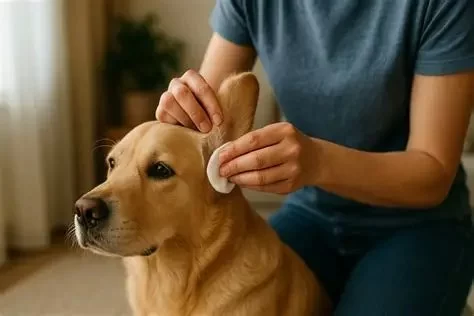- 1 - Why Ear Care Matters in 2025
- 2 - Understanding Your Dog’s Ear Health
- 3 - Preparing to Clean Your Dog’s Ears
- 4 - Step-by-Step: How to Safely Clean Your Dog’s Ears
- 5 - Real Stories from Dog Owners
- 6 - When to Seek Professional Help
- 7 - Preventing Future Ear Problems
1 - Why Ear Care Matters in 2025
Dog ear care has always been important, but in 2025 veterinarians are stressing it even more due to rising cases of ear infections linked to environmental allergies and diet changes. Learning how to safely clean your dog’s ears at home in 2025 means more than hygiene—it’s about proactive health management. Regular cleaning can prevent infections, reduce vet bills, and improve your pet’s comfort.
2 - Understanding Your Dog’s Ear Health
Different Breeds, Different Risks
Floppy-eared breeds like Cocker Spaniels and Basset Hounds are more prone to moisture build-up, while active water-loving dogs like Labradors may trap bacteria after swimming. Knowing your dog’s unique risks helps shape how you approach cleaning routines.

8525 Baltimore National Pike Suite E, Ellicott City, MD 21043, USA
See DetailsSigns of Trouble
Head shaking, scratching, redness, swelling, or unusual odors often indicate early problems. If you notice these, cleaning alone may not be enough—you may need veterinary care to rule out infections or mites.
3 - Preparing to Clean Your Dog’s Ears
Before you begin, gather the right tools: a veterinarian-approved ear cleaner, sterile gauze or cotton pads (never cotton swabs), and a towel. Choose a quiet space where your dog feels calm. Some owners find treats or gentle praise keeps their dog relaxed throughout the process.
Experts from Hidden Brook Veterinary recommend avoiding homemade cleaners like vinegar unless specifically guided by a vet, as the wrong solution can irritate sensitive ear tissue.
4 - Step-by-Step: How to Safely Clean Your Dog’s Ears
Step 1: Apply Cleaner
Hold your dog’s ear flap up and gently squeeze a small amount of ear cleaning solution into the ear canal. Don’t let the tip of the bottle touch the ear to avoid contamination.
Step 2: Massage Gently
Massage the base of the ear for 20–30 seconds. You’ll often hear a squishy sound—this is the solution breaking up debris inside the canal.
Step 3: Allow Your Dog to Shake
Most dogs will instinctively shake their heads, which helps bring wax and dirt to the surface. Place a towel nearby to catch splashes.
Step 4: Wipe Clean
Use gauze or a cotton pad to wipe away loosened debris. Never insert anything deep into the ear canal—only clean what you can see comfortably.
5 - Real Stories from Dog Owners
Emma from Austin recalls how her Golden Retriever, Max, constantly battled ear infections until she learned how to safely clean his ears at home in 2025 using her vet’s recommended cleaner. Within months, the infections decreased, and Max became less irritable. Another dog owner shared online how their rescue pup initially panicked during ear cleanings, but with patience, treats, and gentle reassurance, ear care became a bonding activity.
6 - When to Seek Professional Help
Even with proper home care, there are times when professional evaluation is necessary. If you see persistent discharge, blood, swelling, or if your dog shows pain when you touch the ear, stop cleaning and schedule a vet visit. Facilities like Hidden Brook Veterinary offer diagnostic checks and treatments that go beyond what’s possible at home.
7 - Preventing Future Ear Problems
Routine Maintenance
Weekly ear checks paired with monthly cleanings are enough for most dogs, though breeds with higher risk may require more frequent care. After swimming, always dry ears gently to minimize moisture build-up.
Holistic Health Approach
Diet and environment play a role in ear health. Food allergies and dust exposure can trigger inflammation, so addressing these factors reduces the need for constant cleanings. Pair this with professional guidance from trusted sources like Hidden Brook Veterinary to create a full-circle preventive plan.
By mastering how to safely clean your dog’s ears at home in 2025, you’re not just practicing hygiene—you’re strengthening your pet’s overall well-being and building trust through care.











